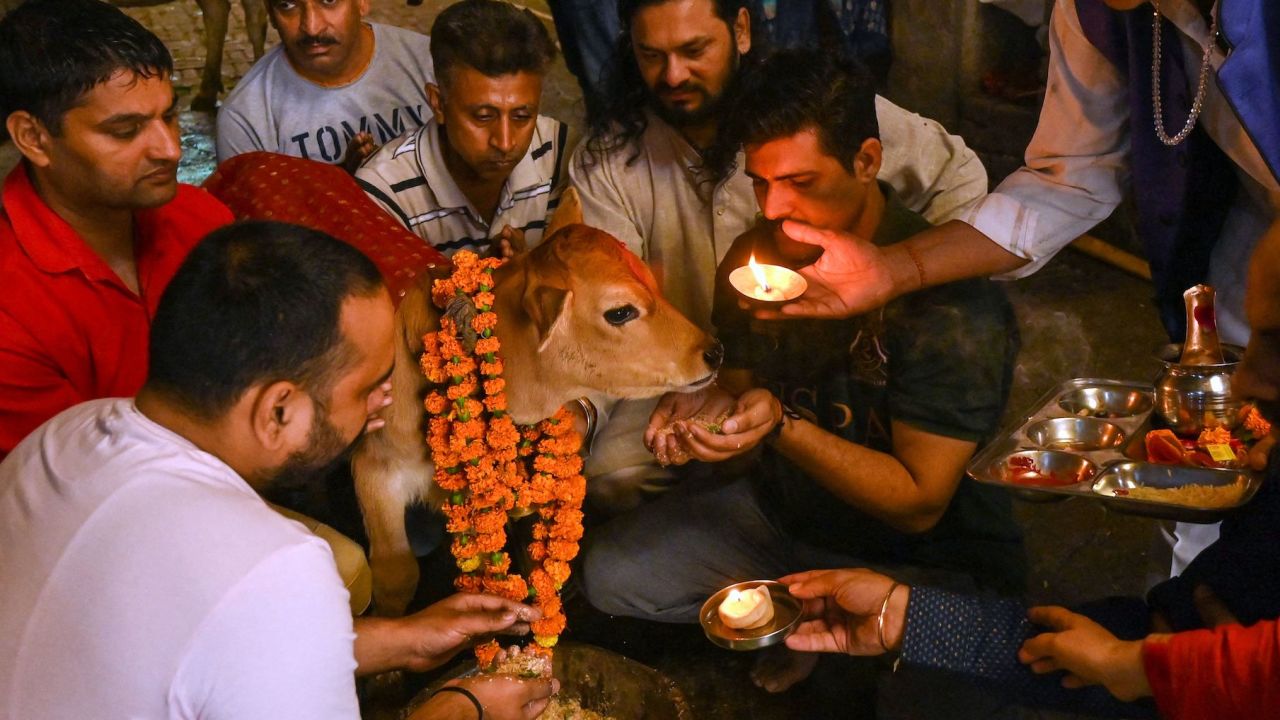


This article dives into the cultural and religious significance of the Hindu festival of Gopashtami, dedicated to worshiping Lord Krishna and cows. The festival, celebrated primarily in Uttar Pradesh, Rajasthan, and Gujarat, falls on November 8 and 9 this year. It is believed that cows hold the blessings of 33 Gods and Goddesses and worshipping them on this day provides remedies for financial crisis and removes the defects of the nine planets in life. The article also explores the different customs and rituals, such as feeding cows, performing parikrama, and applying cow's feet dust on the forehead, to seek blessings from Lord Krishna and the cow.
Gopashtami: A Celebration of Cows and Lord Krishna
Introduction
Gopashtami, a Hindu festival celebrated on the eighth day of the Kartik month, holds great significance in the cultural and religious traditions of India. It is dedicated to the worship of Lord Krishna, the divine cowherd, and cows, which are revered as sacred beings in Hinduism. Primarily observed in the states of Uttar Pradesh, Rajasthan, and Gujarat, Gopashtami falls on November 8 and 9 this year.
Cultural and Religious Significance
Cows are considered holy in Hinduism and are believed to represent the divine mother, Kamadhenu. They are said to possess the blessings of 33 Gods and Goddesses, and worshipping them on Gopashtami brings prosperity and fulfills wishes. The festival is also believed to provide remedies for financial crises and remove the negative effects of the nine planets in one's life.
Customs and Rituals
Gopashtami is celebrated with various customs and rituals. Devotees offer prayers to Lord Krishna and cows, decorating their homes and temples with garlands and flowers. They feed cows with special offerings such as jaggery, bananas, and gram flour. A common ritual is the "parikrama," where devotees circumambulate the cows seven times while chanting devotional songs.
Another significant practice is the application of cow's feet dust on the forehead. This is believed to bring the blessings of Lord Krishna and protect against evil. Farmers often worship their cows and bulls on this day, seeking prosperity for their livestock and agricultural endeavors.
Top 5 FAQs and Answers
1. When is Gopashtami celebrated? Answer: Gopashtami is celebrated on the eighth day of the Kartik month, which usually falls in November.
2. Why are cows revered in Hinduism? Answer: Cows are considered sacred in Hinduism because they represent the divine mother, Kamadhenu, and are believed to possess the blessings of 33 Gods and Goddesses.
3. What are the benefits of worshipping cows on Gopashtami? Answer: Worshipping cows on Gopashtami is believed to bring prosperity, fulfill wishes, provide remedies for financial crises, and remove the negative effects of the nine planets.
4. How is Gopashtami celebrated in Uttar Pradesh? Answer: In Uttar Pradesh, Gopashtami is celebrated with grand festivities, including parades featuring cows decorated with colorful garlands and ornaments.
5. What is the significance of applying cow's feet dust on the forehead? Answer: Applying cow's feet dust on the forehead is believed to bring the blessings of Lord Krishna and protect against evil.

Read all the latest news, reviews, and features from The Hindu's e-Paper - from world affairs and the Indian perspective, to updates in entertainment, technology, science, and health, as well as insights on books and literature. Stay informed with the top stories of the day, and gain unique perspectives on various topics and issues.

The video of a unique farewell given to IAS officer Sanskriti Jain has been making rounds on social media, drawing admiration and praise for its emotional touch. The former Collector of Madhya Pradesh's Seoni district was seen being carried in a decorated palanquin by her colleagues and staff, accompanied by her two young daughters. Her tenure in Seoni was marked by her dedication, people-oriented work, and close interactions with the district administration and residents. The warm speeches, garlands, and sense of camaraderie at the event reflected the strong bond between Sanskriti Jain and her team in Seoni.

Shani Jayanti, the day dedicated to the worship of Lord Shani, falls on May 27, 2025, coinciding with Jyeshtha Amavasya. As per Udayatithi, the puja and rituals should be performed on the same day. However, certain tasks should be avoided on Shani Jayanti. Read on to know the significance of this day and the dos and don'ts to please Shani Dev.

Chief Minister Yogi Adityanath visited the Shanti Ashram in Lucknow to pay his last respects to Sant Shiromani Sai Chanduram, the head priest of the Ashram. He draped the mortal remains of Sant Shiromani with a saffron Angvastra and paid homage before his statue. Expressing deep sorrow over his demise, the Chief Minister wrote on social media about the irreparable loss of the spiritual leader. A large number of devotees gathered at the Ashram premises to offer their tributes and follow his teachings and ideals.

In an effort to improve vision care in rural India, the Bhaktivedanta Hospital & Research Institute held a Mega Eye & Dental Camp in Barsana, Uttar Pradesh. Equipped with state-of-the-art technology, the hospital aims to perform over 5000 PHACO procedures, free of cost, for those in need. The support of Tata Capital Ltd. enabled the camp to expand its reach to over 50,000 beneficiaries and receive the support of esteemed dignitaries including Smt. Hema Malini Ji and Smt. Nupur Desai.

Indian society has a narrow and sexist definition of parvarish, praising daughters who conform to traditional gender roles and blaming parents if they don't. However, it's time to focus on dismantling patriarchy within the household and raise a feminist generation. This means providing equal education to both daughters and sons, encouraging critical thinking and questioning societal norms. Parvarish should not mean curbing basic legal rights but rather empowering individuals to make their own decisions and think for themselves.

India's festival of lights, Deepawali, has been officially recognized by UNESCO as an intangible cultural heritage of humanity. The inscription acknowledges the festival's cultural significance and its ability to bring communities together. Prime Minister Narendra Modi welcomed the announcement, stating that Deepawali holds a special place in India's culture and represents values such as hope and righteousness. This recognition is expected to increase the festival's global popularity even further.

During Prime Minister Narendra Modi's recent visit to Tokyo, the city welcomed him with the soulful chanting of the Gayatri Mantra, one of the most sacred and powerful verses in Indian spiritual tradition. This ancient mantra, found in the Rig Veda, is believed to have a mental healing effect due to its repetitive and focused chanting. Research has also shown that it can improve well-being and provide a sense of peace and connection for both religious and non-religious individuals.

The M3M Foundation unveils 'Payal@40' campaign to commemorate Dr. Payal Kanodia's 40th birthday on December 9, 2025. This campaign, which aims for comprehensive impact across education, healthcare, skill development, and women's empowerment, reflects a leadership approach rooted in service and compassion. With the vision of Dr. Kanodia, the campaign marks a pivotal moment for the Foundation's ongoing mission of equitable development in India.

In a unique move to promote tourism, Madhya Pradesh Chief Minister Mohan Yadav has planned to hold cabinet meetings at famous heritage sites in the state. The latest meeting will take place at Khajuraho Convention Centre, known for its architectural wonders. The two-day visit will also include a jungle safari in Panna Tiger Reserve and review meetings of various departments, highlighting the state's vast natural and cultural beauty.